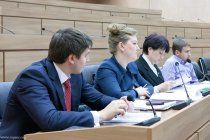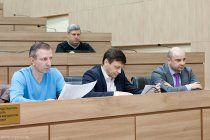 Русский
Русский English
English-







Regular anti-crisis law-in-draft
Комитет по развитию предпринимательства и промышленности
The current situation in the republic's economy prompted management to develop a new measures aimed at minimizing the negative impact of external economic factors. This is due to including the projected deterioration of the government. Regular anti-crisis law-in-draft, presented for consideration of the Supreme Council was discussed by members of parliamentary committee on the development of small, medium-sized businesses and industries.
The essence of the initiative is to introduce dozens of new regulations. Among them, there are financial and construction amnesties. The first is aimed at the legalization and involvement in the legal trade previously hidden or understated natural and legal persons of income, as well as property and bank accounts. It is expected that it will be of voluntary-declarative character and save them from financial penalties. Amnesty in the construction industry will introduce legally in the operation of constructed facilities, reconstructed or rebuilt without issuing permits. The only requirement – is compliance with minimum security requirements.
In addition, it is proposed to introduce the term "prevention" and give the state functions to regulate the prices of goods, not classified as socially significant to administrative code. Production and sale of products of national crafts, according to the author of the law-in-draft, can be carried out without having to purchase a patent today. Another innovation – is the provision of long-term use at no cost of land to individuals and legal entities for the construction of residential buildings and industrial facilities. Application of this rule is expected in the period from 1 May to 31 December 2015.
With regard to taxation. It was proposed to vest right in the government to lower the rate of UST in case of increase in the number of jobs in the company, the size of the income tax for the employees and the rates of customs duties on imported vehicles. Perhaps liberation organizations from income tax and individuals from paying property tax in respect of objects constructed in 2014-2016, respectively.
All these measures were recognized by members of the committee of small and medium sized business as justified. The only point of the law-in-draft, which caused a sharp debate – is granting the government the right to introduce external management organization any form of ownership in case of crisis. Three parameters are clearly spelled out, which will open together for state the access to the reins of the company. These are: non-payment of wages during the quarter, the suspension of more than a month of production activities and the reduction of more than 20% of workers. Parliamentarians were strongly against such a proposal. They asked about the range of functions and external control of those who will be responsible, if the head that was appointed outside can not cope with a crisis situation or make it worse. Participation in this scenario of owners is not clear yet. Chances are good that their rights will be violated, and the financial risk is not reduced.
In the course of the discussion, the government insisted that it is necessary to think first and foremost about people who may lose their jobs, and the state, which will have to take on their content. It was recommended to postpone worries about the investment climate until better times. Parliamentarians, in turn, tried to convey to opponents, that the loss of investors will automatically lead to job cuts. Lawmakers assured it is impossible to divide these factors.
As a result, a lengthy discussion by the Committee on the development of small, medium-sized businesses and industry decided to recommend adoption of the presidential law-in-draft to the Plenary, taking into account the conceptual observations based on rejection of assignment to the Government the right to impose external control of enterprises in difficult economic situation.




